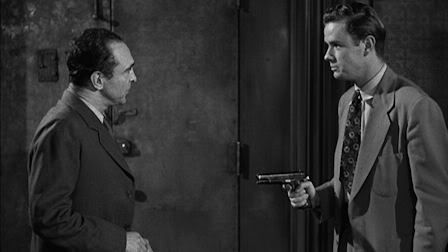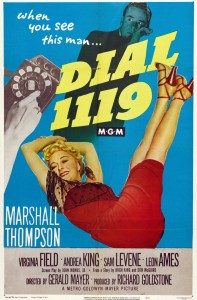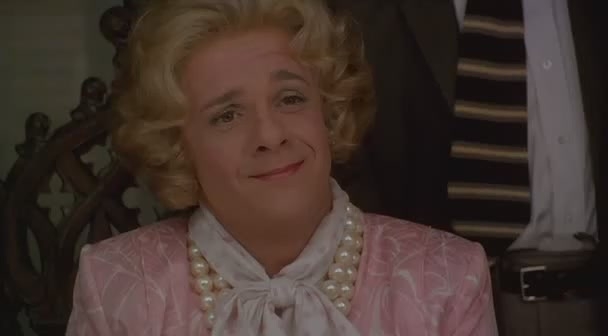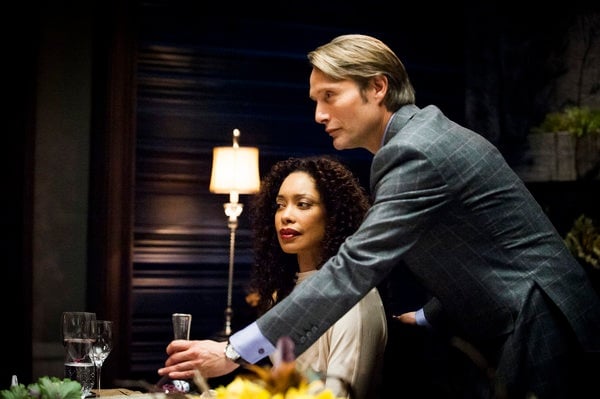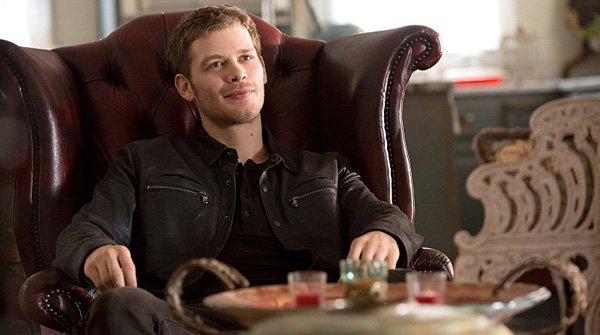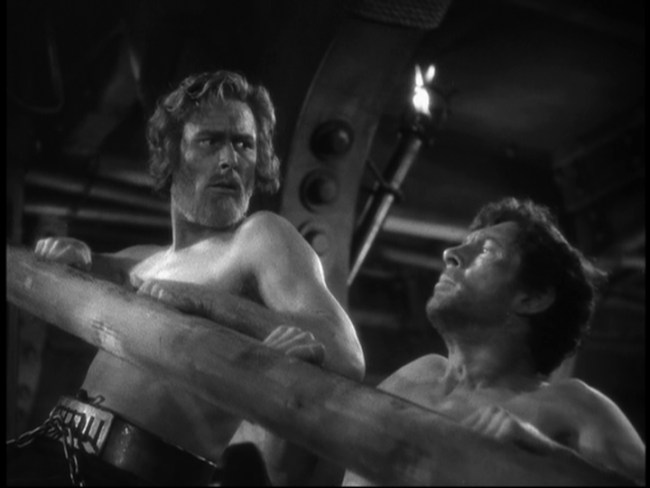Directed by Gerald Mayer
Written by Hugh King and Don McGuire
U.S.A., 1950
If there is one thing about older films which can cause a surprise among modern audiences, it is the acting style of the period. A frequent complaint coming from those whose exposure to movies of the 30s, 40s and 60s is limited is that the variety of the acting is vastly different from what is typically experienced today. Back then, being a bit more on the theatrical, or melodramatic side, was a good thing, whereas in the early 21st century, subtlety is what people admire most. Imagine what a melodramatic performance serving a mentally challenged character would be like, a thought which could very well turn people away from watching Marshall Thomspon in Dial 1119, but those people will have missed perfectly calculated, chilling role.
Director Gerald Mayer, nephew of the legendary producer Louis B. Meyer, starts off Dial 1119 by having the viewer cross the series of characters who will be caught up in the evening’s terrifying events. One is a 28 year old single woman (Virgina Field) living with her mother who has plans to go out with a man, another is a newspaper reporter who has finally quit his job after years of thankless work, and then there are the employees of the bar where the majority of the story shall take place, such as bartender Chuckles (William Conrad), the table waiter skip (Keefe Brasselle), as well some of its usual customers, more commonly referred to as ‘bar flies’, like Helen (Andrea King). The most important character to be introduced however, and definitely the creepiest, is Gunther Wyckoff (Marshall Thompson), a quiet man riding on a voyager bus. His focus rests squarely on one thing only: the pistol that the driver has laid in the compartment above his head. Gunther steals the weapon during a 5 minute break, shoots the driver dead and embarks on a search around town for a specific individual, unknown to the audience at this point. When his search leaves him empty handed, he heads over to the bar where all of the previously revealed characters have converged for a pleasant evening, only to be victims of Gunther’s abrupt hostage takeover. It is not long before the police, led by captain Henry Keiver (Richard Rober) are at the scene just outside. Gunther makes his demand clear: unless his former doctor, John Faron (Sam Levene), does not arrive within the next half hour, everyone in the bar will be shot dead…
There are plenty of fascinating elements which make up the gritty, at sometimes surprisingly dark nightmare that is Dial 1119. The most glaring just might be Marshal Thompson, whose character, it is revealed shortly after the hostage takeover (so this information is not much of a spoiler), happens to be a mentally challenged escapee from an institute nearby. His actions leave no doubts in the minds of the viewer that he is not only unwell, but a highly volatile and dangerous individual who should not be crossed. Thompson plays the part convincingly, but not because there is a constant glimmer of lunacy in his eyes. Gunther is not a madman in the sense that the Joker is a madman who laughs at all the evildoing he relishes in. Our antagonist is, for lack of a better term, a quietly disturbed soul. Rare are the instances when Gunther has a fit of rage, or explodes into extended periods of violent behaviour. Instead, it is a eerily quiet and controlled silence with which Gunther intimidates his victims. One knows perfectly well that an animal lurks beneath, and in that specific sense the performance is a bit showy, but is it packaged, as much as possible, by a veneer of stoicism. Thompson is absolutely chilling in the role, the rare false notes being when confronted and verbally assaulted by Dr. Faron in the late stages of the story. In those few moments Thompson engages in the familiar ‘mental breakdown’ fit, but on the whole he gives one of the strangest, awkwardly powerful performances by any actor playing a villain in a film noir.
The quality of the casting goes much beyond just Marshal Thompson though. Dial 1119‘s lineup of actors and actresses with filled with names few are probably familiar with. The only name or face that may ring a bell for those versed in the genre is that of William Conrad, who here plays the bartender. For the most part, these are not the top tier names of the period. Even within the genre. This aspect helps make the quality of the characters all the more pleasing, with every performer lending their role with a distinctive personality. It is not much of a surprise that the film never allows for the characters to fully develop to the point where the viewer knows them intimately, but by the end director Mayer has given a strong indication of what sort of personality drives each one of them. There is the slightly uptight young single woman who wavers between a desire for freedom and her duties to an ailing mother, her date of the evening who is much older than her (in fact pretends that she is his niece as a cover-up) but very well spoken and behaves with a ‘happy go lucky’ attitude, the miserable, disillusioned newspaper reporter, the easy on the eyes and flirtatious blonde, etc. Are the characters one note? Mostly, yes, but in a film of this nature, it is interesting that the writers and director still wanted to make each memorable and sufficiently developed, rather than have only one or two stand out with the rest of the bunch simply being a mass. Two other actors who give splendid performances, whose characters are on the outside looking for the most part, are Sam Levene as the doctor and Richard Rober. The tension between the two makes for some great exchanges, the cop wanting to take Gunther down as quickly as possible while the doctor wants an opportunity to walk into the bar and calm the target down through dialogue. The doctor’s previous efforts, which had in fact saved Gunther from execution, is another clever point of contention between the two. Their scenes consist of the flip side of the tension existing within the bar, as they argue the best strategic approach to obtaining the mutually exclusive results each wants.
For as violent as many noirs are, oftentimes the violence is controlled, or guided by the morbid rules with dictate the behaviour of characters who inhabit this shadowy realm. Essentially, there is a time and a purpose for the violence. After all, in most of them the villains, vile as they may be, are not lunatics. In Dial 1119, the unfortunate nature of the antagonist changes the game a little bit. Because he does not have complete control over his faculties, when violence erupts, it happens quickly and with an added sense of shock. So as to not reveal too much, the identity of those who fall at the point of Gunther’s stolen pistol shall remain a secret for this review, but some characters meet unexpected ends. In one instance, after the murder of Gunther’s first victim in the bar, contrary to what a director usually did during this era, the camera returns to the victim’s body, including in its picture frame the poor sap’s lifeless face, emphasizing the brutality of the death, and above all else the finality of the act. It is a bold directorial choice which echoes Gunther’s psychology: the shot of the dead body in its full ugliness mirrors Gunther’s lack of compassion. Granted, a lack of compassion which he cannot help, but a lack nonetheless. The film’s tension crescendos steadily until, what else, hard core action is chosen over diplomacy. In a movie that emphasized violence as the course of action to take to get what one wants, the ending, while bleak, is fitting.
One final note should highlight the superb transitional edits director Mayer exercises in Dial 1119. The film does have a nice, sharp look overall, but what visual touches separate themselves are the transitions, of that there is little doubt. Fade ins and fade outs, cuts from a ventilation shaft to a fan in the bus where Gunther’s committed his first murder, the image of the Dr. Faron walking across the street towards the bar turns into a shot of the bar’s television set airing the news report which itself is showing the doctor as he makes his way over, a close up of a radio signalling that people should beware of a specific individual currently on the loose which fades into a shot of Gunther as we see him through the bus’ window as some reflections dance on its surface …pretty much every transition in the film is cleverly devised and appealing.
In a verdict that is becoming the norm in Sound on Sight’s Friday Film Noir column, Dial 1119 is an excellent entry which fans should not overlook.
-Edgar Chaput
